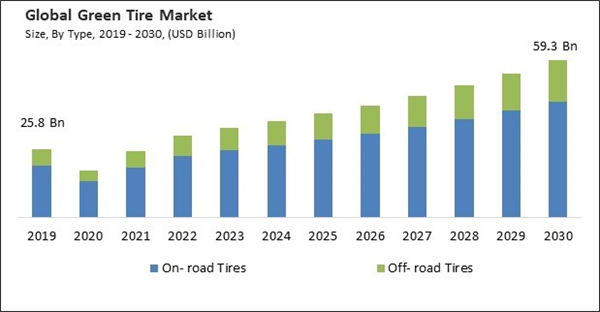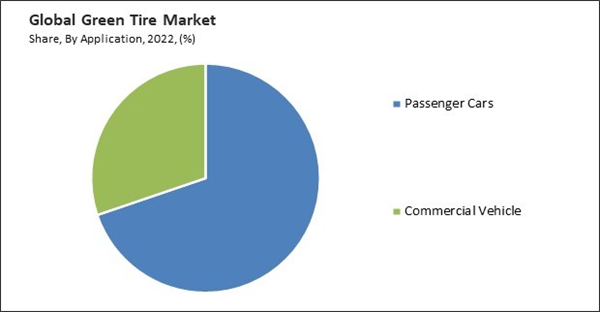Green tires are designed to have lower rolling resistance compared to conventional tires. Rolling resistance is the force that opposes the movement of a tire as it rolls on the road. Green tires minimize this resistance, requiring less energy to keep the tire rolling. Therefore, On-road Tires segment would generate $23,336.9 million revenue in the market in 2022. As a result, vehicles equipped with green tires experience less resistance and, consequently, better fuel efficiency. For individual consumers, green tires translate into real cost savings at the gas pump. Some of the factors impacting the market are rising concerns related to carbon emissions, prioritization of safety and sustainability during manufacturing and less adoption due to the higher cost of green tires.
Environmentally conscious consumers often seek products that align with their values. It provide consumers with a choice that benefits their wallets through improved fuel efficiency and contributes to a cleaner and healthier planet. Additionally, the reduction in rolling resistance directly translates into improved fuel efficiency. It enable vehicles to travel more on the same amount of fuel as conventional tires with higher rolling resistance. Improved fuel efficiency means the engine burns less energy to generate the same amount of power, reducing carbon dioxide (CO2) emissions. Additionally, Green tire manufacturers utilize eco-friendly materials, such as bio-based additives, natural rubber, and recycled content, in tire production. These materials reduce the environmental impact of tire manufacturing by conserving natural resources and reducing the need for petroleum-based materials. Harmful chemicals in tire production can have adverse environmental and health effects. These processes minimize energy consumption during production, contributing to lower greenhouse gas emissions and reduced environmental impact. These factors will drive the worldwide demand in the coming years and all these factors are expected to boost the demand in the market.
However, the reduced demand due to their higher price point can also slow innovation in the market. Tire manufacturers may be less inclined to invest in research and development to improve the cost-efficiency of green tire production further or enhance their performance characteristics. The growth of the market may become heavily dependent on government incentives and regulations that promote eco-friendly products. The market may struggle to compete with lower-cost traditional tires without such incentives. Therefore, these factors will pose restraints for the future growth of the market.
Type Outlook
Based on type, the market is bifurcated into on-road tires and off-road tires. In 2022, the off-road tires segment garnered a significant revenue share in the market. Green off-road tires are known for their reduced rolling resistance, which translates into improved fuel efficiency. In sectors where fuel costs are a significant operational expense, such as construction and agriculture, these tires offer substantial cost savings over time. Regulatory bodies in various regions are placing stricter emissions and environmental regulations on off-road vehicles. Green off-road tires help operators comply with these regulations by reducing fuel consumption and emissions. Therefore, these factors will help in increasing demand in the segment.Application Outlook
On the basis of application, the market is divided into passenger cars and commercial vehicle. The passenger cars segment recorded the maximum revenue share in the market in 2022. Ongoing research and development efforts in the market have led to tire materials and construction innovations. These advancements allow manufacturers to produce green tires that offer improved performance, safety, and durability, meeting the stringent requirements of passenger cars. As consumer awareness of green tires increases, there is a growing demand for these eco-friendly options. Owing to these factors, the segment will proliferate in the coming years.Sales Channel Outlook
On the basis of sales channel, the market is divided into OEM and aftermarket. In 2022, the aftermarket segment witnessed a substantial revenue share in the market. Green tires are no longer perceived as a compromise on performance. Advancements in tire technology have allowed green tires to offer competitive or even superior handling, traction, and safety performance, further driving aftermarket sales. Online retail platforms provide consumers with detailed information about green tire options, allowing them to make informed choices. This digital landscape has facilitated aftermarket sales by offering convenience and transparency. These factors are expected to boost the demand in the aftermarket segment.Tire Size Outlook
Based on tire size, the market is segmented into 15 inch, 16 inch, 17 inch, and 18 inch. The 15 inch segment held the largest revenue share in the market in 2022. Compared to larger wheel sizes, 15-inch green tires are generally more affordable, making them an attractive choice for budget-conscious consumers. This affordability factor contributes to their popularity. The 15-inch segment benefits from a robust aftermarket for tire replacement. Consumers prioritizing sustainability are more likely to explore green tire options when replacing worn-out tires on their 15-inch wheels. Therefore, the segment will witness increased growth in the upcoming years.Regional Outlook
By region, the market is segmented into North America, Europe, Asia Pacific, and LAMEA. The Asia Pacific segment procured the highest revenue share in the market in 2022. Governments in the Asia Pacific region have implemented regulations and incentives to promote environmentally friendly products, including green tires. These regulations may include stricter emissions standards and labeling requirements that encourage the use of fuel-efficient and low-rolling-resistance tires. These factors will help in the growth of the Asia Pacific segment.The market research report covers the analysis of key stake holders of the market. Key companies profiled in the report include Zhongce Rubber Group Co., Limited, Toyo Tire Corporation, Nokian Tyres plc, MRF Limited, Continental AG, Bridgestone Corporation, Pirelli & C. S.p.A., The Goodyear Tire & Rubber Company, Hankook Tire & Technology and The Yokohama Rubber Co., Ltd.
Strategies deployed in the Market
- Jun-2023: Continental AG launched the UltraContact NXT, a tire in the sustainable series. UltraContact NXT exhibits technological leadership and focuses on sustainability and safety.
- Jun-2023: Hankook Tire & Technology enhanced its iON line of tires designed for electric vehicles by adding the iON evo and iON evo SUV. The new products offer better performance in summer for high-performance EVs. Additionally, the products are built on iON technology, which provides unique grip performance, tread wear, and noise reduction for EVs.
- May-2023: The Yokohama Rubber Co., Ltd. completed the acquisition of Trelleborg Wheel Systems, a tire and wheel technology brand. Through this acquisition, Yokohama TWS was formed, which will operate as a new company with its original organizational structure. Additionally, this acquisition enabled Yokohama Rubber to establish its position among the leading tire producers in the world.
- Jul-2022: Continental AG took over NorrVulk AB, a company that sells and services conveyor belts. Through this acquisition, Continental enhanced its portfolio of conveyor belt systems and related services and boosted its business with industrial customers.
- Apr-2022: Bridgestone Americas, Inc., a subsidiary of Bridgestone Corporation, partnered with LanzaTech NZ, Inc., an innovative Carbon Capture and Transformation (“CCT”) company. Through this partnership, both companies developed a tire recycling process and paved the way towards material circularity and the decarbonization of new tire production.
- Feb-2022: Bridgestone Corporation formed a partnership with ENEOS Corporation, a fully integrated oil company. Through this partnership, a joint research and development project was introduced with the aim of achieving chemical recycling technologies that help in the pyrolysis of used tires.
- Jun-2021: The Goodyear Tire & Rubber Company acquired Cooper Tire & Rubber Company, an American company that specializes in the design and manufacture of replacement automobile and truck tires. Through this acquisition, a combined company was formed to provide a wider variety of product options to customers. Additionally, Goodyear served more customers globally and supported greater investments in the fleet and mobility solutions.
- Apr-2020: Toyo Tire Corporation partnered with JAOS Corporation, a world-leading manufacturer of aftermarket SUV equipment. Through this partnership, the companies raised the value of their brands in the 4WD and SUV markets around the world. Additionally, the companies participated in motorsport events and product testing and increased their knowledge to offer advanced products on the market.
Scope of the Study
Market Segments Covered in the Report:
By Type- On-road Tires
- Off-road Tires
- Passenger Cars
- Commercial Vehicle
- OEM
- Aftermarket
- 15 inch
- 16 inch
- 17 inch
- 18 inch
- North America
- US
- Canada
- Mexico
- Rest of North America- Europe
- Germany
- UK
- France
- Russia
- Spain
- Italy
- Rest of Europe- Asia Pacific
- China
- Japan
- India
- South Korea
- Singapore
- Malaysia
- Rest of Asia Pacific- LAMEA
- Brazil
- Argentina
- UAE
- Saudi Arabia
- South Africa
- Nigeria
- Rest of LAMEA
Key Market Players
List of Companies Profiled in the Report:
- Zhongce Rubber Group Co., Limited
- Toyo Tire Corporation
- Nokian Tyres plc
- MRF Limited
- Continental AG
- Bridgestone Corporation
- Pirelli & C. S.p.A.
- The Goodyear Tire & Rubber Company
- Hankook Tire & Technology
- The Yokohama Rubber Co., Ltd.
Unique Offerings
- Exhaustive coverage
- The highest number of Market tables and figures
- Subscription-based model available
- Guaranteed best price
- Assured post sales research support with 10% customization free
Table of Contents
Companies Mentioned
- Zhongce Rubber Group Co., Limited
- Toyo Tire Corporation
- Nokian Tyres plc
- MRF Limited
- Continental AG
- Bridgestone Corporation
- Pirelli & C. S.p.A.
- The Goodyear Tire & Rubber Company
- Hankook Tire & Technology
- The Yokohama Rubber Co., Ltd.










